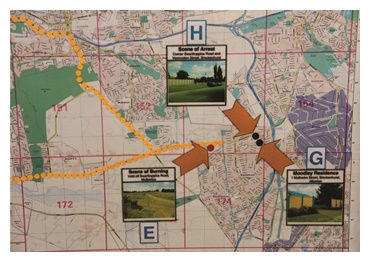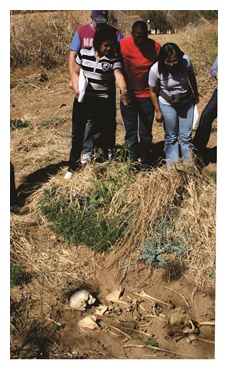By Kotie Geldenhuys
The investigation of crime requires both experience and proficient detective work. The pointing-out of crime scenes by a suspect is an important part of the investigation and goes hand in hand with confessions and admission. The pointings-out of crime scenes happen when suspects are taken to an alleged crime scene to inform the police about what had happened.
Pointings-out are referred to in section 218 of the Criminal Procedure Act 51 of 1977:
"218. Admissibility of facts discovered by means of inadmissible confession
(1) Evidence may be admitted at criminal proceedings of any fact otherwise in evidence, notwithstanding that the witness who gives evidence of such fact, discovered such fact or obtained knowledge of such fact only in consequence of information given by an accused appearing at such proceedings in any confession or statement which by law is not admissible in evidence against such accused at such proceedings, and notwithstanding that the fact was discovered or came to the knowledge of such witness against the wish or will of such accused.
(2) Evidence may be admitted at criminal proceedings that anything was pointed out by an accused appearing at such proceedings or that any fact or thing was discovered in consequence of information given by such accused, notwithstanding that such pointing-out or information forms part of a confession or statement which by law is not admissible in evidence against such accused at such proceedings."
In S v Sheehama 1991(2) SA 860(A) the Supreme Court of Appeal (SCA) stated that pointings-out were to be considered to be admissions by conduct and that their admissibility was accordingly to be governed by the provisions of section 217 (confessions) and section 219A (admissions) (Van Zyl, 2015).
Keeping the distance
The investigating officer must keep his or her (physical) distance during the pointing-out process. In fact, it is of utmost importance that the investigating officer does not participate in the pointing-out process at the crime scene. D/Capt Ben Booysen, who investigated the Krugersdorp murders (refer to the Crime Series published in Servamus: July, August and September 2020) explains that when a task team is part of an investigation, nobody who is part of that investigation must be at the crime scene where pointings-out are made. According to Adv Zaais van Zyl SC, a retired prosecutor, he had to explain to court, more than once why the investigating officer's vehicle could be seen in some photos taken during the pointing-out process (Van Zyl, 2015).
*****************************
[This is only an extract of an article published in Servamus: November 2021. If you are interested in reading the rest of the article, send an e-mail to: This email address is being protected from spambots. You need JavaScript enabled to view it. to find out what you need to do. Other issues that are highlighted is the pointing-out process at the crime scene and the importance of time during the process. Ed.]








